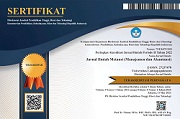Analisis Efektivitas Pengelolaan Anggaran Belanja Operasional Kantor Pencarian Dan Pertolongan Kelas B Nias
Abstract
The aim of this research is to determine the level of effectiveness of operational budget management for the Class B Nias Search and Rescue Office. On this occasion the researcher conducted research by using data and dealing directly with information parties deemed necessary and related to the problem under study, namely as much as 5 people who are officials from the Nias Class B Search and Rescue Office. Based on research results, the effectiveness level in 2020 was 79.707%, and in 2021 it was 87.694%, still less effective. In this research, the factors that cause an ineffective level of shopping effectiveness are due to a lack of human resources both in terms of quantity and quality, and the Covid-19 pandemic.
References
Civelek, M., Durda, L., Vincúrová, Z., Dudáš, T., & Brezina, I. (2022). The differences in the impact of entrepreneurial abilities of various European SMEs on their financial risk perceptions. Entrepreneurial Business and Economics Review, 10(4), 107–124. https://doi.org/10.15678/EBER.2022.100407
Fauzi, F., Antoni, D., & Suwarni, E. (2020). Women entrepreneurship in the developing country: The effects of financial and digital literacy on SMEs’ growth. Journal of Governance and Regulation, 9(4), 106–115. https://doi.org/10.22495/JGRV9I4ART9
Frimpong, S. E., Agyapong, G., & Agyapong, D. (2022). Financial literacy, access to digital finance and performance of SMEs: Evidence From Central region of Ghana. Cogent Economics and Finance, 10(1). https://doi.org/10.1080/23322039.2022.2121356
Halawa, F., Iswanto, D., Reinelda, B., & Yunarni, T. (2023). JOURNAL OF MANAGEMENT Small and Medium Enterprises (SME’s) Vol 16, No. 3, November 2023, p495-501 Febriyanti Amol, Forman Halawa, Dedy Iswanto, Baiq Reinelda Tri Yunarni. 16(3), 7–10.
Hamdana, Murwani, F. D., Sudarmiatin, & Hermawan, A. (2022). The effects of financial and technology literacy on the sustainability of Indonesian SMEs: Mediating role of supply chain practice. Uncertain Supply Chain Management, 10(4), 1449–1456. https://doi.org/10.5267/j.uscm.2022.6.011
Msomi, T. S., & Nzama, S. (2022). Financial literacy and SME loan repayments in South Africa during the COVID-19 era. Investment Management and Financial Innovations, 19(4), 113–121. https://doi.org/10.21511/imfi.19(4).2022.09
Ngek, N. B. (2016). Performance implications of financial capital availability on the financial literacy - Performance nexus in South Africa. Investment Management and Financial Innovations, 13(2), 354–362. https://doi.org/10.21511/imfi.13(2-2).2016.10
Nkundabanyanga, S. K., Kasozi, D., Nalukenge, I., & Tauringana, V. (2014). Lending terms, financial literacy and formal credit accessibility. International Journal of Social Economics, 41(5), 342–361. https://doi.org/10.1108/IJSE-03-2013-0075
Nugraha, D. P., Setiawan, B., Nathan, R. J., & Fekete-Farkas, M. (2022). Fintech Adoption Drivers for Innovation for SMEs in Indonesia. Journal of Open Innovation: Technology, Market, and Complexity, 8(4), 208. https://doi.org/10.3390/joitmc8040208
Nuzulia, A. (1967). Tinjauan Literatur Tentang Pengembangan Pembelajaran Dalam Mengimplementasikan Kurikulum 2013 Alfin. Angewandte Chemie International Edition, 6(11), 951–952., 01(01), 5–24.
Owusu, J., Ismail, M. Bin, Osman, M. H. B. M., & Kuan, G. (2019). Financial literacy as a moderator linking financial resource availability and SME growth in Ghana. Investment Management and Financial Innovations, 16(1), 154–166. https://doi.org/10.21511/imfi.16(1).2019.12
Purwanto, A., Tukiran, M., Asbari, M., Hyun, C. C., Santoso, P. B., & Wijayanti, L. M. (2020). Model kepemimpinan di lembaga pendidikan: a schematic literature review. Journal of Engineering and Management Science Research (JIEMAR), 1(2), 255–266. https://journals.indexcopernicus.com/search/article?articleId=2660964
Raden Soebiartika, & Ida Rindaningsih. (2023). Systematic Literature Review (SLR): Implementasi Sistim Kompensasi dan Penghargaan Terhadap Kinerja Guru SD Muhammadiyah Sidoarjo. MAMEN: Jurnal Manajemen, 2(1), 171–185. https://doi.org/10.55123/mamen.v2i1.1630
Satria, C., Maulina, E., Purnomo, M., & Suryanto, T. (2023). Performance Improvement in Small and Medium Enterprises; Financial Literacy and Business Experience: A case of Palembang City. Quality - Access to Success, 24(193), 268–277. https://doi.org/10.47750/QAS/24.193.30
Shah, S. Z. A., Anwar, M., & Hussain, C. M. (2021). Top managers’ attributes, innovation, and the participation in China–Pakistan Economic Corridor: A study of energy sector small and medium-sized enterprises. Managerial and Decision Economics, 42(2), 385–406. https://doi.org/10.1002/mde.3242
Sulistianingsih, H., & Santi, F. (2023). Does SME’s financing decisions follow pecking order pattern? The role of financial literacy, risk preference, and home bias in SME financing decisions. Cogent Business and Management, 10(1). https://doi.org/10.1080/23311975.2023.2174477
Thomas, N. M. (2023). Modeling key enablers influencing FinTechs offering SME credit services: A multi-stakeholder perspective. Electronic Markets, 33(1). https://doi.org/10.1007/s12525-023-00627-6
Toth, R., & Kasa, R. (2022). SMEs before and during COVID-19. Risks.
Tóth, R., Zéman, Z., Túróczi, I., Kása, R., Popp, J., & Oláh, J. (2021). The system of relationships between sustainable corporate governance and corporate financial literacy. Polish Journal of Management Studies, 23(1), 418–435. https://doi.org/10.17512/pjms.2021.23.1.26














